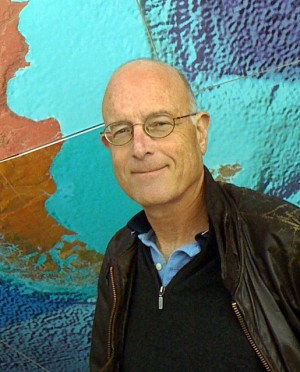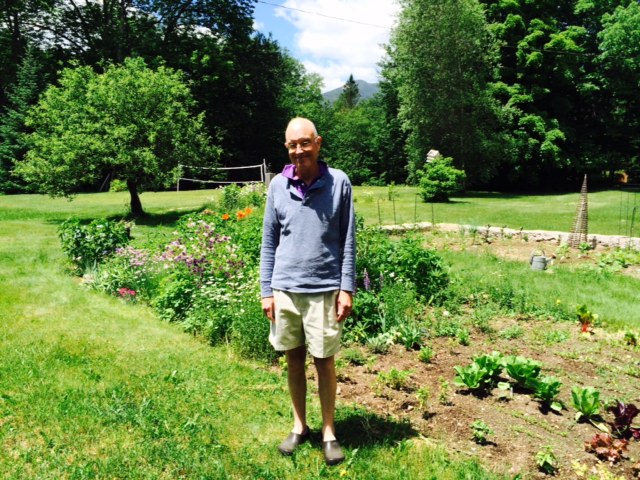August 2, 2022
I just had a bit of a shock. Someone asked me where they could find the video of Joe Semmes that we had done for the Cancer Community Center (now the Dempsey Center) in 2014. I mentioned that Joe had gotten in touch with me in 2019 because he wanted to update the video. I responded but never heard back from him. I found out why this morning. Joe passed away on June 18, 2020. If you were fortunate to know Joe, you know it’s an understatement to say he was a wonderful human being. He was more than that. He was remarkable. In honor of his passing, this is the blog post I wrote about him in 2014, and his video Choose Love, Not Fear.
July 4, 2014
In 1996, Dr. B. Joseph Semmes, who goes by the name Joe, learned that he had a type of cancer of the pancreas called pNET or pancreatic neuroendocrine tumors. Not only is it rare — seen in approximately one percent of pancreatic cancers and three in one million of all cancers diagnosed — it’s also less aggressive than other pancreatic cancers and can often be cured.
Joe describes life since his diagnosis as “dancing the dance with cancer.” Two and a half years ago, he thought the music was about to end. He had gastrointestinal bleeding that wouldn’t stop and doctors couldn’t find the cause. At one time an emergency medicine physician at Mercy Hospital and director of research at the former True North Health Center, he was forced to go on sabbatical. His world revolved around lengthy hospital stays and repeated blood transfusions.
Joe managed to pull through and he and his family made some significant lifestyle changes. They sold their home in Maine and now spend cold months in New Orleans and warm months in New Hampshire. It’s a simpler life that includes lots of yoga and walks outdoors.
We spoke on the phone recently and here’s how he described his morning up to that point:
“I’m good. I just wolfed down a fried egg and bacon and some cherries after getting back from a wonderful hour and a half yoga session in a barn overlooking Mount Whiteface in the Sandwich range (of the White Mountains) in New Hampshire. It’s about 68 and sunny, the first day of summer. I’ve been working in the vegetable garden. I’ve got some asparagus and that’s been a treasure coming out. The cherry trees are exploding. It’s really gorgeous over here.”
The last time I saw Joe face-to-face he was grappling with his medical setback both physically and emotionally. We were in his living room and my husband Barry and his business partner Pete Smith (they run a video production company called Smith Atwood Video Services) were taping him as he shared his “top ten list for seriously ill cancer patients.”
The taping came about because a local magazine publisher was looking for several people with cancer who would be willing to write about their experiences for an upcoming issue. Joe was recommended by the Cancer Community Center in South Portland, now known as the Dempsey Center.
He came up with a list of things he had learned that he thought might help other cancer patients. Folks at the Dempsey Center were moved by what he wrote and like everyone else, including Joe, worried that he didn’t have long to live. They asked him about going on tape and he agreed even though he didn’t feel well at all, which certainly says something about the man.
One of the things Joe has accomplished since his brush with death is to become certified in hospice/palliative medicine. A goal is to help create palliative care programs at medical schools. If nothing more, he hopes to be an effective squeaky wheel and help make people understand the importance of such programs. “I believe the quality and, in many cases, the value and quantity of life can be improved with early palliative care,” says Joe.
Before Joe can move forward with his palliative care goals, he has to attend to something more personal. About two months ago, a diagnostic scan picked up some spots of cancer on his liver. “That made us scared and sad for a little bit, but since then we’ve been able to kind of recover and look at the landscape and see what choices were open. It’s rather extraordinary compared to when I first started dancing this dance with cancer. Then, many treatments weren’t available.”
Although it will take a chunk out of his retirement fund, on July 9th Joe will fly to Switzerland for a targeted therapy that is not readily available in the United States. “It’s very elegantly targeted to the kind of tumor I have,” he explains. “It’s called a peptide receptor radionuclide therapy and it’s possible because the tumor I have has receptors for a human growth hormone or a molecule that’s made that’s very similar. This peptide or protein molecule can be linked to a radionuclide that is injected into my bloodstream and carried right to the tumor, where it causes destruction and shrinkage of the tumor.”
The targeted therapy treatment is not considered a cure but may give Joe from two to eight years of progression-free survival. “Which is great,” he says. “It’s a bridge to the next thing.”
Right now, the next thing could be a more personalized cancer treatment. Through genetic testing that looks at tumor mutations, he learned that he has two mutations. One is targetable with a medication that is currently being used to treat lung cancers with the same mutation responsible for his cancer. The drug is called crizotinib and it’s new, very expensive, experimental, and probably unavailable through insurance or Medicare. Down the line, it could be within his reach. Newer targeted therapies might also be available.
“It is an enticing and fascinating dance that these new treatments are available,” says Joe, “but [medical experts] caution us about many of these targeted new breaking cancer therapies. They can be not only expensive but have adverse effects that are unforeseen and lack efficacy after a number of uses or months or years. It’s still a dance that’s not completely understood, but the game continues, the dance music continues.”
Joe recommends two books that have helped him maneuver this often “arrhythmic and erratically- tempoed dance with cancer”:
When Joe and I talked about the video of his top ten list he mentioned, “when I get to the top three or four, I sound like I have pretensions to be above it all. They are strategies to get out of the squirming discomfort of being scared and depressed. I’m quite capable of being frightened and sad and in denial and disorganized.”
I asked him what he would like people to come away with after reading his story. He answered, “As all of us approach obstacles, a lot of those obstacles are in us ourselves. Somewhere I saw an aphorism that said something to the effect that ‘once you know who you are or you accept who you are, then you can change.’ I think that along with the challenges of the medical and physiological aspects of dealing with these life-threatening chronic diseases is the deeper question of what is our meaning and where is our equanimity in living our lives and how do we live to die well? I’m reminded of the fact that it seems to be a call to let go of the ego and [practice] mindful listening and being kind.
Joe’s top ten list may be for seriously ill cancer patients, but the lessons he has learned might benefit any one of us. Here’s Joe’s video:
February 2019
About seven years have passed since we published Joe’s Top Ten video. He got in touch with me a few months ago to say he’d been doing well and to suggest that we update the video. Once winter is over and he returns to New England, we plan to do just that.
Joe’s obituary
Here is the link to Joe’s obituary: Benedict Joseph “Joe” Semmes (October 20, 1949 ~ June 18, 2020). May he rest in peace, and my condolences to his family.



Hi Joe,
Thank you for sharing your story and for your focus on the importance of the work Hospice does. I admired your outlook and your willingness to try new procedures that will, one day, lead to a cure. I think Yoga is in itself a healing exercise.
I wish you the best with this dance with cancer.
Betsy
If you get a chance to speak with Joe, tell him I send my best wishes for a full recovery. Joe and I knew each other when he was a resident at Roosevelt Hospital in New York City. We hung out together sometimes, when we had free time. Please pass on my email address to him. I would love to hear from him.
Thank you.
Marika
Please let Joe know that the nurses at Arlington Hospital in Virginia are thinking about him. We recently got together and wondered how Joe was doing. I was a volunteer there for over 20 years and left in 1997. We would love to reconnect with Joe.
Thank You.
I will let him know. I heard from him recently.
Although we have never met, Joe and I share a last name. That is how I happened to find his YouTube video.
I enjoyed the video and hung on every word. Please thank Joe for sharing the very valuable wisdom of his experience. He is an inspiration and I pray for his health and comfort.
And thank you, Diane, for making his video possible. You are doing such important work through this website.
I will let him know. We plan to do an update sometime in the spring. He’s been doing well, knock on wood. Thank you for your kind words.